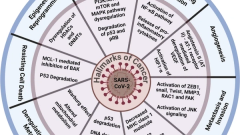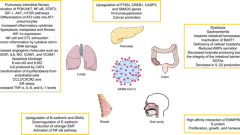Cancer patients undergoing transplantation-based treatments can develop graft-versus-host disease (GVHD), an inflammatory condition that increases mortality risk. In this study, we analyzed three cancer patients with severe inflammatory disorders following SARS-CoV-2 infection using high-resolution microscopy and spatial transcriptomics on pre- and post-infection GI biopsies. We found that up to 49 days after infection, the duodenal epithelium retained COVID viral elements, showed increased expression of viral receptors, inflammatory genes, and interferon activity, and exhibited tissue scarring. Notably, SERPINA1 was a persistent marker of infection and inflammation, also present in ∼600 GI tumor samples, suggesting its role as a broader inflammation marker. These findings indicate that the GI epithelium can serve as a long-term COVID reservoir, potentially driving inflammatory syndromes similar to GVHD. This persistent viral presence may pose additional risks for cancer patients undergoing transplantation, highlighting the need for further investigation into post-COVID inflammatory complications in cancer patients.
SARS-CoV-2 infection drives local inflammation of the intestinal epithelium in immunocompromised patients with cancer
Aug 25, 2025|iScience

Related Content

SARS-CoV-2 infection as a potential risk factor for the development of cancer
ABSTRACT: The COVID-19 pandemic has a significant impact on public health and the estimated numb...

Oncogenic potential of SARS-CoV-2—targeting hallmarks of cancer pathways
ABSTRACT The 2019 outbreak of SARS-CoV-2 has caused a major worldwide health crisis with high ra...

Possible cancer-causing capacity of COVID-19: Is SARS-CoV-2 an oncogenic agent?
ABSTRACT Severe acute respiratory syndrome coronavirus 2 (SARS-CoV-2) has shown diverse life-thr...

The risk of pancreatic adenocarcinoma following SARS-CoV family infection
ABSTRACT COVID 19 disease has become a global catastrophe over the past year that has claimed th...